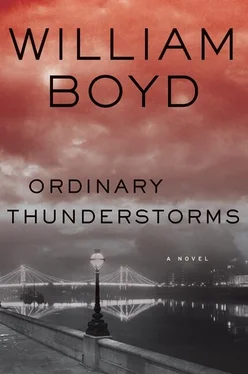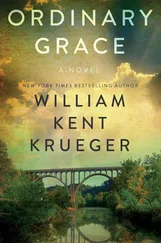He stopped, interrupted by the arrival on board of a fat harassed woman and a plump, placid child, a girl, carrying a balloon and eating a chocolate bar. Turpin pressed his elbow into Adam’s side.
“Hello, hello. That’s a nice little chicken,” Turpin said, admiringly. “Very nice. You married, Adam?”
“I was. I’m divorced.”
“Kiddies?”
“No.”
“I love little kiddies,” Turpin said. “You know, ‘proof of heaven’, as they say…I’ve had a lot of kids myself, nine or ten. Eleven. I like little boys, little chaps, but I’m a little-girl man at heart. Sweet little darlings. What about you, Adam? Boys or girls?”
“I haven’t really thought about it.”
“Girls for me, all the way. But after the age often it all changes,” Turpin said, ruefully, almost bitterly. “Goes to the bad. Not the same. Nah.”
Adam looked out at the street as the bus pulled up at a traffic light. A policeman stood there, looking directly at him. Adam smiled, vaguely, confidently anonymous.
“Yeah, but listen: John Christ,” Turpin said, returning to his original argument. “What if Bishop Yemi’s right and John, disciple John, is the real Christ and like Jesus was the fall guy…The patsy. Like it was a cover-up.”
“I think I must have missed that bit.”
“The point being that the Romans think they’ve got the real guy — Jesus — but John, the true Christ, goes off scot-free. Clears off to Patmos, lives to be a hundred and writes Revelation. On his own Greek island.”
“It’s all nonsense, I told you, raving nonsense.”
“Hold on, hold on. They were like freedom fighters, a cell. The guy they crucify — Jesus — isn’t the real leader. It’s John.”
“Why not sacrifice a goat to the sun-god Ra?”
“Say again? No, I mean — I think Bishop Yemi may be on to something, here. Makes a kind of sense.”
Turpin was still expatiating on the possibilities of this clever hoax when they both left the bus at Sloane Square and walked down to the river. They paused at Chelsea Bridge, leaning on the parapet, looking out at the ebb tide, the black flowing water lit by the hundreds of light bulbs positioned on the bridge’s superstructure and suspension cables.
“Got a smoke?” Turpin asked.
“Sorry, no.”
“I’ll cadge a smoke off of someone. You get off to your bed, Adam. See you tomorrow, mate.”
Adam said goodnight and wandered off, not particularly wanting Turpin to see where he dossed down, so he crossed to the other side of the Embankment, opposite the triangle, and dawdled along the railings of the Royal Hospital, glancing back to see Turpin accosting passers-by. When he eventually cadged a cigarette and lit up and began to cross the bridge towards the Battersea shore, Adam scurried across the road and climbed over the fence, secure in the knowledge that Turpin hadn’t seen him.
In his small clearing Adam hung his new jacket and trousers carefully on a branch and removed his clean, un-ironed shirt, before sliding into his sleeping bag. He lay there, snug under his bush, feeling strangely confident. He hadn’t enjoyed such a sensation of unremarkable but genuine ease and pleasantness since the murder. He wasn’t hungry, he realised, that was what was different, and now he had a place he could go to for hearty, sustaining food where no one was curious about him and no questions were asked. Everything was going to change, he felt sure: he had seen the way forward. His begging life was about to begin.
THE BATH WAS IDEALLY hot and full enough so that the bubbles came up to his chin. Ingram wallowed, ran his hands over his naked body and felt himself both relax and anticipate. Today was his birthday — he was fifty-nine years old — and he was about to enjoy his birthday present to himself: a most agreeable way, he considered, of entering his sixtieth year.
“Where are you going?” Meredith had said, appalled, seeing him in a suit and tie on a Saturday morning. “I thought we were having lunch.”
“There’s a crisis, darling,” he had said. “Crisis meetings. One of those ghastly days. I’ll be back by six, promise. Oh, and I have to see Pa, as well.”
“Don’t be late,” she had said. “Everyone’ll be here at seven.”
Ingram picked up a floating sponge and squeezed hot water over his head. This was what he needed after the grim affair that had been Philip Wang’s funeral last week. Putney Vale Crematorium, even on a summer’s day, summed up everything in the word ‘joyless’, Ingram thought. Philip’s mother — a tiny, frail woman, weeping and uncomprehending — had flown over from Hong Kong with his sister. There had been a superb turnout from the boys and girls in the Calenture lab at Oxford. Not such a good showing from head office but then Philip wasn’t really known to them, other than by name and reputation. Ingram had written and read the eulogy himself, concentrating, naturally enough, on his own relationship with Philip. How, in the early days of Calenture-Deutz’s growth, Philip had virtually single-handedly developed the anti-hay fever drug Bynogol in pill form and nasal inhaler — Calenture-Deutz’s first real earner — and the breakthrough discoveries made during that Bynogol process (Ingram was always a bit unsure about the chemistry) had led Philip directly on to evolve Zembla-i, and its subsequent derivatives, into what should prove to be the world’s first truly effective asthma drug. How had he put it at the funeral? “Philip’s death was brutal and senseless but everything about his life was the exact opposite. We have lost Philip but the world’s gain will be incalculable.” Quite nicely phrased, he thought — almost aphoristically balanced: death and life, loss and gain.
Ingram leaned forward and ran some more hot water into the bath. He remembered that day when Philip had come in to his office, had come up from Oxford to London at very short notice, wanting to talk, he said, about asthma. He was visibly excited and Ingram kept having to tell him to slow down and repeat himself. He had been testing some antigens, he said, tiny spores that provoke the allergic response that is hay fever, with a view to improving Bynogol. In one of the tests he had used some pollen from a type of magnolia that he had collected on his last trip to see his mother in Hong Kong. To his astonishment, this antigen, meant to provoke a hay-fever attack — swelling, mucus, irritation and so forth — had instead produced the opposite effect. Rather than generating the secretion of toxic Th2 cells of a classic allergic attack, benign Thi cells were secreted in their place. He started talking very fast at this stage about histamines, leukotrienes and IgE antibodies and Ingram told him to stop.
“Words of one syllable, please, Philip,” he said. “I’m not a scientist. What’s all this to do with asthma?”
Philip drew breath and began to explain. No one really knows why there is a worldwide epidemic of asthma, he said. There are 20 million sufferers in the USA, 5 million in Great Britain, tens of millions of others in the developed world (Ingram was impressed by these numbers). There was a line of thought that saw asthma, an inflammation stimulated by an allergy, as some kind of malfunction of our prehistoric immune system. The immune system defences of early man were meant to be triggered by ancient organisms that no longer exist — organisms that flourished in the primordial mud — but were now being activated by pollens, mites, feline dust, air conditioning, bright sunlight, newspapers, aerosols, cigarette smoke, perfumes, etcetera. Asthma sufferers, in other words, were victims of our malfunctioning, prehistoric immuno-defence systems.
“What is so intriguing,” Philip continued, his voice rising a register, “is that the angiosperm—”
Читать дальше












